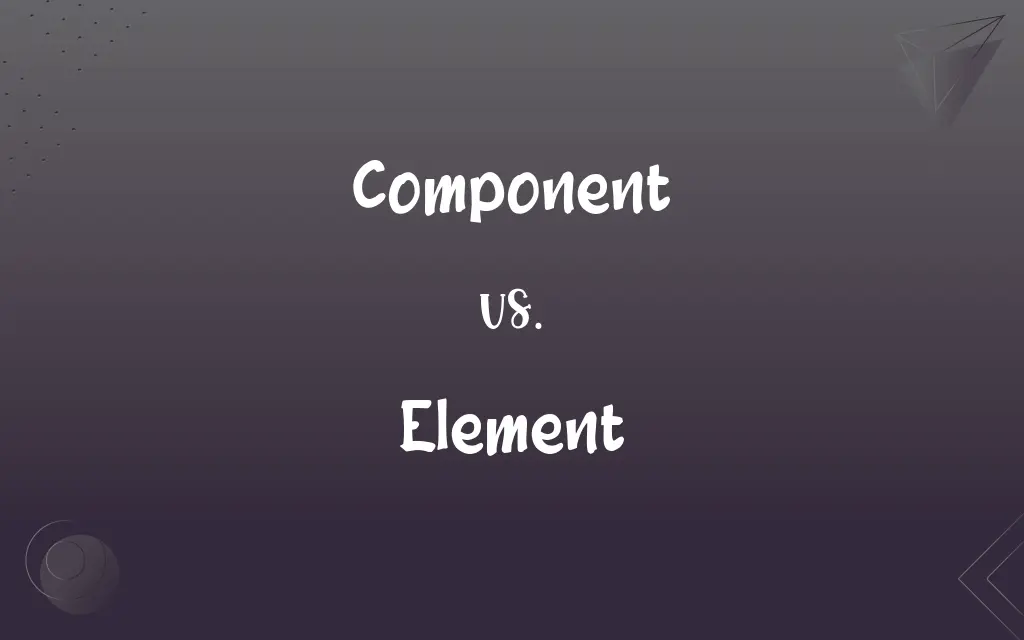Component vs. Element: What's the Difference?
Edited by Harlon Moss || By Janet White || Updated on September 24, 2023
A component is a part or element of a larger whole, typically a part of a machine or system, while an element is a fundamental or essential part of a whole.

Key Differences
Component and element refer to parts of a whole, but they are employed in different contexts and express varying nuances. A component is generally used to describe a part that is essential to the functioning of a whole, often used in technical or mechanical contexts, like in machines or systems. An element, conversely, refers to a more fundamental, basic part or principle that is inherent or essential to the nature of something, often used in a broader range of contexts, including chemistry, mathematics, and general language.
In discussing systems or machines, the term component usually denotes pieces or parts that come together to form the complete entity. Each component plays a crucial role, and the absence of a component might affect the functionality or performance of the whole system. In contrast, an element can refer to a basic constituent part of any entity, whether it’s a scientific concept, a learning curriculum, or a philosophical idea, and it might represent a piece, a principle, or a characteristic of the whole.
Components can often be physically identified and separated from the system they are part of, such as the components of a computer. These are tangible parts that each have a specific function in making the entire system operate effectively. On the other hand, an element does not necessarily have to be a physical part; it can also represent abstract concepts or characteristics, such as elements of design, which include line, shape, and color, and these are more conceptual than tangible.
In essence, while both component and element refer to parts of a whole, the usage of component is often more specific and is typically associated with tangible parts of machines or systems. The term element is more versatile and can refer to both tangible and intangible, concrete and abstract parts or principles that are fundamental to the nature of something.
Comparison Chart
Nature
Usually tangible and physical.
Can be both tangible and intangible.
ADVERTISEMENT
Usage
Often used in technical or mechanical contexts.
Used in broader contexts including scientific and general.
Functionality
Essential part of a system or machine.
Fundamental or essential part of a whole.
Separability
Can often be separated from the whole.
May or may not be separable depending on the context.
Specificity
More specific, related to systems or machines.
More versatile, representing basic constituents or principles.
Component and Element Definitions
Component
An ingredient contributing to the whole.
Flour is a main component in baking bread.
ADVERTISEMENT
Element
A natural or habitat condition.
Sunlight is a crucial element for plant growth.
Component
A subdivision of a larger structure.
The engine is a complex component of an automobile.
Element
A fundamental, essential, or irreducible constituent of a composite entity.
Component
A modular part of a software system.
Each software component operates independently.
Element
Elements The basic assumptions or principles of a subject.
Component
A constituent element, as of a system.
Element
A member of a set.
Component
A constituent piece having a specific function in a system.
A resistor is a component in electronic circuits.
Element
A point, line, or plane.
Component
A part of a mechanical or electrical complex.
Element
A part of a geometric configuration, such as an angle in a triangle.
Component
(Mathematics) One of a set of two or more vectors having a sum equal to a given vector.
Element
The generatrix of a geometric figure.
Component
Being or functioning as a constituent or an ingredient.
Element
Any of the terms in the rectangular array of terms that constitute a matrix or determinant.
Component
A smaller, self-contained part of a larger entity. Often refers to a manufactured object that is part of a larger device.
A CPU is a component of a computer.
Element
Chemistry & Physics A substance composed of atoms having an identical number of protons in each nucleus. Elements cannot be reduced to simpler substances by normal chemical means. See Periodic Table.
Component
Making up a larger whole; as a component word.
Element
One of four substances, earth, air, fire, or water, formerly regarded as a fundamental constituent of the universe.
Component
Made up of smaller complete units in combination; as a component stereo.
Element
(Electricity)The resistance wire in an electrical appliance such as a heater or an oven.
Component
Serving, or helping, to form; composing; constituting; constituent.
The component parts of natural bodies.
Element
Elements The forces that constitute the weather, especially severe or inclement weather:outside paint that had been damaged by the elements.
Component
A constituent part; an ingredient.
Element
An environment naturally suited to or associated with an individual:He is in his element when traveling. The business world is her element.
Component
An abstract part of something;
Jealousy was a component of his character
Two constituents of a musical composition are melody and harmony
The grammatical elements of a sentence
A key factor in her success
Humor: an effective ingredient of a speech
Element
A distinct group within a larger community:the dissident element on campus.
Component
Something determined in relation to something that includes it;
He wanted to feel a part of something bigger than himself
I read a portion of the manuscript
The smaller component is hard to reach
Element
A ground unit in an air force comparable to a platoon.
Component
An artifact that is one of the individual parts of which a composite entity is made up; especially a part that can be separated from or attached to a system;
Spare components for cars
A component or constituent element of a system
Element
A unit of an air force equal to two or three aircraft.
Component
A part or element of a larger whole.
The motherboard is a crucial component of a computer.
Element
Elements The bread and wine of the Eucharist.
Element
One of the simplest or essential parts or principles of which anything consists, or upon which the constitution or fundamental powers of anything are based.
Letters are the elements of written language.
Element
(chemistry) Any one of the simplest chemical substances that cannot be decomposed in a chemical reaction or by any chemical means and made up of atoms all having the same number of protons.
Element
One of the four basic building blocks of matter in theories of ancient philosophers and alchemists: water, earth, fire, and air.
Element
A basic, simple substance out of which something is made, raw material.
Element
(legal) A required aspect or component of a cause of action. A deed is regarded as a violation of law only if each element can be proved.
Element
(set theory) One of the objects in a set.
Element
(mathematics) One of the entries of a matrix.
Element
Any of the teeth of a zip fastener.
Element
A small part of the whole.
An element of the picture
Element
A small but present amount of a quality, a hint.
An element of doubt
Element
A factor, one of the conditions contributing to a result.
Element
(obsolete) The sky.
Element
(obsolete) Any one of the heavenly spheres believed to carry the celestial bodies.
Element
Atmospheric forces such as strong winds and rains.
Exposed to the elements
Element
A place or state of being that an individual or object is best suited to.
To be in one's element
Element
The bread and wine taken at Holy Communion.
Element
A group of people within a larger group having a particular common characteristic.
You sometimes find the hooligan element at football matches.
Element
(in the plural only) The basic principles of a field of knowledge, basics, fundamentals, rudiments.
Element
A component in electrical equipment, often in the form of a coil, having a high resistance, thereby generating heat when a current is passed through it.
The element in this electric kettle can heat the water in under a minute.
Element
(mathematics) An infinitesimal interval of a quantity, a differential.
The element of area in Cartesian coordinates is dx dy.
Element
(astronomy) An orbital element; one of the parameters needed to uniquely specify a particular orbit.
Element
(computing) One of the conceptual objects in a markup language, usually represented in text by tags.
Element
(obsolete) To compound of elements.
Element
(obsolete) To constitute and be the elements of.
Element
One of the simplest or essential parts or principles of which anything consists, or upon which the constitution or fundamental powers of anything are based.
Element
One of the ultimate, undecomposable constituents of any kind of matter. Specifically: (Chem.) A substance which cannot be decomposed into different kinds of matter by any means at present employed; as, the elements of water are oxygen and hydrogen.
Element
One of the ultimate parts which are variously combined in anything; as, letters are the elements of written language; hence, also, a simple portion of that which is complex, as a shaft, lever, wheel, or any simple part in a machine; one of the essential ingredients of any mixture; a constituent part; as, quartz, feldspar, and mica are the elements of granite.
The simplicity which is so large an element in a noble nature was laughed to scorn.
Element
One out of several parts combined in a system of aggregation, when each is of the nature of the whole; as, a single cell is an element of the honeycomb.
Element
One of the simplest essential parts, more commonly called cells, of which animal and vegetable organisms, or their tissues and organs, are composed.
Element
An infinitesimal part of anything of the same nature as the entire magnitude considered; as, in a solid an element may be the infinitesimal portion between any two planes that are separated an indefinitely small distance. In the calculus, element is sometimes used as synonymous with differential.
Element
One of the necessary data or values upon which a system of calculations depends, or general conclusions are based; as, the elements of a planet's orbit.
Element
The simplest or fundamental principles of any system in philosophy, science, or art; rudiments; as, the elements of geometry, or of music.
Element
Any outline or sketch, regarded as containing the fundamental ideas or features of the thing in question; as, the elements of a plan.
Element
One of the simple substances, as supposed by the ancient philosophers; one of the imaginary principles of matter.
Of elementsThe grosser feeds the purer: Earth the Sea;Earth and the Sea feed Air; the Air those FiresEthereal.
Does not our life consist of the four elements?
And the complexion of the element [i. e.,the sky or air]In favor's like the work we have in hand,Most bloody, fiery, and most terrible.
About twelve ounces [of food], with mere element for drink.
They show that they are out of their element.
Element
The conditions and movements of the air.
Element
The whole material composing the world.
The elements shall melt with fervent heat.
Element
The bread and wine used in the eucharist or Lord's supper.
Element
To compound of elements or first principles.
Element
To constitute; to make up with elements.
His very soul was elemented of nothing but sadness.
Element
An abstract part of something;
Jealousy was a component of his character
Two constituents of a musical composition are melody and harmony
The grammatical elements of a sentence
A key factor in her success
Humor: an effective ingredient of a speech
Element
Any of the more than 100 known substances (of which 92 occur naturally) that cannot be separated into simpler substances and that singly or in combination constitute all matter
Element
An artifact that is one of the individual parts of which a composite entity is made up; especially a part that can be separated from or attached to a system;
Spare components for cars
A component or constituent element of a system
Element
One of four substances thought in ancient and medieval cosmology to constitute the physical universe;
The alchemists believed that there were four elements
Element
The most favorable environment for a plant or animal;
Water is the element of fishes
Element
The situation in which you are happiest and most effective;
In your element
Element
A straight line that generates a cylinder or cone
Element
A fundamental constituent of a larger whole.
Oxygen is an element essential for human survival.
Element
A part of an environment or a set.
Water is a key element in this ecosystem.
Element
A basic principle or aspect.
Trust is an essential element of a healthy relationship.
Element
An abstract part of a concept or subject.
Rhythm is an important element of music.
FAQs
Can an element be an abstract concept?
Yes, an element can be both a tangible part or an abstract concept.
Is a component integral to a system's function?
Yes, components are integral, and their malfunction can affect the whole system.
Is an element always fundamental to a whole?
Typically, an element is considered a fundamental or essential part of a whole.
Can an element refer to a basic substance in chemistry?
Yes, in chemistry, an element refers to a substance consisting of one type of atom.
Is an element broader in usage than a component?
Yes, element has broader usage and can apply in more varied contexts.
Can a component be easily replaced?
It depends on the system, but components are often designed to be replaceable.
Are components always interconnected?
In most systems, components are interconnected to function cohesively.
Is a component always a physical part?
Typically, but not always, as it can also refer to abstract parts in some contexts.
Can a system function without one of its components?
Usually, the absence of a component affects the functionality of the system.
Are elements in nature always visible to the naked eye?
No, some natural elements are not visible to the naked eye, like gases.
Can a component be part of a software system?
Yes, a component can be a modular part of a software system.
Is the term element used in mathematical contexts?
Yes, in mathematics, an element is a member of a set.
Can elements represent characteristics or principles?
Yes, elements can represent basic characteristics, principles, or parts of a concept.
Can a component be synonymous with a part?
Yes, component is often synonymous with part in many contexts.
About Author
Written by
Janet WhiteJanet White has been an esteemed writer and blogger for Difference Wiki. Holding a Master's degree in Science and Medical Journalism from the prestigious Boston University, she has consistently demonstrated her expertise and passion for her field. When she's not immersed in her work, Janet relishes her time exercising, delving into a good book, and cherishing moments with friends and family.
Edited by
Harlon MossHarlon is a seasoned quality moderator and accomplished content writer for Difference Wiki. An alumnus of the prestigious University of California, he earned his degree in Computer Science. Leveraging his academic background, Harlon brings a meticulous and informed perspective to his work, ensuring content accuracy and excellence.































































